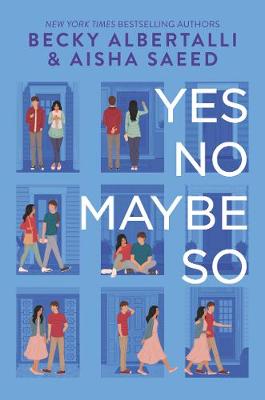Reviewed by Kelly on
Maya Rehman just can't catch a break. Her best friend Sara is preparing for college with her roommate, her parents are on a trial separation and all during the month of Ramadan. Two homes, no friends and no car. When Jamie and the Rossum campaign visits Maya's iftar feast to celebrate the holy month, Maya and Jamie are volunteered by their mothers to canvas for the campaign, knocking door to door to ensure democratic votes in the local election to fill a vacant seat.
What begins as two teens and former childhood friends reconnecting during the campaign, turns out to be a passion for change, to represent marginalised communities and push back against racist ideals of the conservative party. Such a timely read. With many conservative governments holding power within the western world, now more than ever we need books that emphasise the blatant racism and discrimination by our governments and how the smallest of actions can inspire change.
Jamie comes across as quite sullen, he's socially awkward and although he dreams of one day representing his community and becoming a senator, he can't imagine speaking in public without his lunch making a reappearance first. Although Jamie's parents are separated, his father rarely seeing Jamie and his sister Sophie now he's living in the Netherlands, his mother is a force to be reckoned with. She too works long hours for the local senator and involved in every aspect of her children's lives. Jamie is awestruck by Maya's beauty and her tenacity to fight for equality and although he's reluctant to meet new people by canvassing for the campaign, relishes the opportunity to spend time with Maya.
Maya is the more likeable character of the two. Although she's having a terrible time of it lately, she still tries to remain upbeat and positive. Hopeful that her parents trial separation is only a temporary measure. Maya's parents have one rule, no dating, her education is first and foremost. Being Muslim, Maya is also a character of faith and shares her experiences of racism and discrimination, more so of her mother who wears a hijab. In the local election, a racist conservative plans to introduce a new bill which would see head and face coverings banned and deemed as a security risk, the bill targeting Muslim women in particular who choose to wear the hijab. Maya's anger is palpable and with Jamie's support, the two teens petition the local office of the conservative senator to oppose the blatantly racist bill.
Yes No Maybe So isn't about the end result, it's about the journey we take to get there. Both Jamie and Maya are from marginalised backgrounds, essentially fighting against the conservative vote who encourage discrimination against marginalised communities, often hiding hate speech behind their Christianity. For many diverse communities in western countries, this is their reality. Even though both Jamie and Maya's concerns are dismissed by the local conservative candidate, it was interesting to see how tolerable both teens were of those with strong conservative beliefs. I'm not sure I could have extended such kindness. This is such a wonderful introduction to political activism for teens, start small and don't be afraid to set boundaries, it also reiterates the importance of how even the smallest of victories are still a positive step towards change.
Reading updates
- Started reading
- 9 January, 2020: Finished reading
- 9 January, 2020: Reviewed
